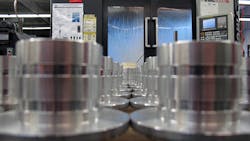The Ultimate Guide to Improving Machine Shop Efficiency
Modern machine shops can be compared to the complex parts they manufacture, with a number of moving parts, all of which require synchronous activity to achieve maximum efficiency. It's a delicate balance to achieve in manufacturing sector known for its physicality.
Keep your process up-to-date — Keeping your business protocol up-to-date and in alignment with current trends and standards is the first step in bolstering your shop's efficiency. Breakthroughs like the Industrial Internet of Things (IIoT), additive manufacturing and the rise in mobile connectivity have led to greater job flexibility and more networking opportunities than ever before.
Although it's still in its infancy stages, the IIoT has already revolutionized the way we look at prototype designs and how we implement specific customer feedback into our new products. It's also introducing an unprecedented level of interconnectedness between the different machines and equipment on the floor.
Educate your employees — According to some studies, workplace fatalities are on the rise. With nearly 5,000 incidents in 2015 alone, the importance of worker health and safety is undeniable. Educating your employees on the presence of workplace hazards, the intricacies of emergency response procedures and the safe operation of the machines in your shop can go a long way in mitigating most of these risks to begin with.
Re-examine your workflow — If you've been working in a shop for an extended period, you've likely examined and re-examined your workflow. While this is often done in times of boredom, the process can actually lead to significant improvements to your daily operations. If possible, designate a whole day for inspecting and analyzing your shop's efficiency. You might be surprised by the bottlenecks and shortcomings you find.
Lean material management is a great strategy when trying to streamline operations and boost efficiency. Since it was originally designed with the manufacturing industry in mind, machine shops of all sizes are able to benefit from the core principles and concepts of the lean methodology.
Organize and collaborate —Take some time to organize your shop. If possible, try to collaborate with your full-time staff and implement their feedback in any redesigns or renovations. This can strengthen the relationships you have with your workers, and a strategically designed warehouse or factory layout can also make it easier for teammates to collaborate in the future.
Industrial plastic totes can make short work of a project like this. Their plastic surfaces are easy to clean, making them reusable, and their rugged durability is ideal for machine shops, factories and warehouses.
Maintain realistic expectations — You'll also want to maintain realistic expectations for your employees as well as yourself. Knowing when to call it a day is just as important to your long-term success as a strong work ethic. Likewise, employees can't be expected to work excessive hours or give up their personal lives just to meet the next production deadline. Maintaining realistic expectations can help prevent such issues from popping up in the first place.
Upgrade your machining tools — Machining tools are the lifeblood of your shop. Trying to produce a precision part with speed and efficiency is nearly impossible if you don't have the right tools for the job. Shops typically allocate a large portion of their budgets toward tooling needs.
Innovations in additive manufacturing, or 3D printing, have reduced the costs and time associated with custom tooling. Instead of outsourcing these duties to a third-party, many shops, including smaller operations, have transitioned to in-house tooling production and refurbishment.
Invest in routine maintenance — Like the machines they use on a daily basis, the modern machine shop also requires routine maintenance to stay in top shape. Also referred to as preventative maintenance or simply PM, this can actually improve the lifespan of your equipment and vastly reduce the risk of a breakdown or malfunction.
Smart machines of today are even able to diagnose themselves. These devices are able to shut themselves down in emergency situations, thereby reducing the risk of personal injury or hardware damage even further. While this might negate some of the importance of your shop repairman, live workers will still be needed to perform regular inspections and intervene when necessary.
Prepare for the "machine shop of the future" — While the IIoT and self-diagnosing machines may seem like futuristic pipe dreams, these breakthroughs are already here. As more tech-savvy shop owners and workers begin to embrace the next generation of machines and tools, machining efficiency is expected to soar.
Megan Nichols recently offered AM readers "5 Reasons a 5-Axis CNC Machine is Actually Good for Your Shop." She is an amateur astronomer and environmentalist, and a writer on a wide range of scientific topics. Other pieces have covered Smart manufacturing, additive manufacturing, gear finishing, Lean manufacturing best practices, the importance of aerospace ceramics, and the “positive disruption” expected from the Industrial Internet of Things. Follow her on Twitter @nicholsrmegan.
About the Author
Megan R. Nichols
STEM writer and blogger
Megan Nichols is a STEM writer and blogger covering a wide range of scientific topics at schooledbyscience.com
